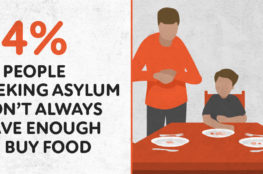Our fortnightly summary of ongoing advocacy initiatives, interesting surveys and research, government developments and useful resources. Contact us if you’d like to get this update directly into your inbox!
1. Ongoing advocacy initiatives
New campaign action on asylum accommodation: #closethebarracks
Last week, Refugee Action launched a new campaign action calling for the barracks at Penally and Folkestone to be shut down and for people seeking asylum to be more appropriately accommodated. The new Email Your MP e-action calls for MPs to write to the Home Secretary to ask that barracks be shut down immediately, hotel use to be strongly restricted and the entire accommodation estate to be urgently repaired and new housing acquired.
To promote the e-action, Refugee Action have also put together two mini-videos that juxtapose Christmas warmth with the reality of how people seeking asylum are currently being treated (“we can’t stay silent when this is where they spend the night”). You can download these videos here.
Below are some draft tweets to accompany the videos and promote the media story, and you can also retweet Refugee Action here. Please use #CloseTheBarracks in your posts.
- We can’t stay silent when people seeking asylum are being dumped in disused army barracks. Conditions are inhumane, traumatising and putting lives at risk. Take action today to #CloseTheBarracks https://act.refugee-action.org.uk/page/73095/action/1?ea.tracking.id=u3fsxjhj [insert video from here]
- We can’t stay silent when people seeking asylum are detained in all but name. In dirty, overcrowded accommodation that is nowhere near Covid-secure. Take action today to #CloseTheBarracks https://act.refugee-action.org.uk/page/73095/action/1?ea.tracking.id=u3fsxjhj [insert video from here]
Duncan Lewis have also reported on their ongoing work to challenge the Home Office’s use of the Penally camp ex-military barracks to house up to 236 people seeking asylum. The Claimants are seeking a quashing of the decision to house asylum seekers at the camp and a declaration that the use of the Camp for this purpose has breached the public sector equality duty, constitutes false imprisonment and a deprivation of liberty, and that the Secretary of State has failed to meet the essential living needs of those at the camp.
Home Office found to have failed to protect destitute people against inhuman and degrading treatment
The High Court has handed down a judgment holding that delays in relocating people seeking asylum living with disabilities to suitable accommodation, and delays with this initial provision of support, is unlawful.
The Court held that the Home Office is in breach of its duties under Article 3 of the European Convention on Human Rights and section 4 of the Immigration and Asylum Act 1999 to protect destitute people against inhuman and degrading treatment caused by homelessness. In particular, failures to monitor the implementation and operation of the AASC contract are found to have led to lengthy and unlawful delays in the provision of accommodation and support for destitute people.
You can read the full judgment by following the link, but useful parts include:
- The Home Office’s failure to monitor the provision of accommodation to disabled migrants is in breach of the Public Sector Equality Duty;
- The Judge rejected the submission by the Secretary of State that disability discrimination was justified on the grounds of immigration control (paras 260-261);
- The Judge highlights that the Home Office’s economic incentives within the contract it has with its private accommodation contractors risks there being a negative impact on disabled people as their accommodation needs are “less profitable (or even unprofitable)” (para 277);
- “It is not possible to reconcile the state of knowledge of the Secretary of State and her officials with the monitoring that is said to be present and is described above. There cannot have been proper monitoring.” (para 65 of the judgment). Again at paragraph 200, the judge finds “The claimants’ cases, and the figures provided to the court, show that the monitoring arrangements either did not happen or do not work”;
- The judgment stresses that particularly where the failure of a private contractual arrangement can lead to a breach of Article 3, the government’s failure to know how the contract is being performed is unlawful;
- The judge rejected the claims by the Home Office that the Claimants’ destitution had been caused by their own “failure to travel” to accommodation which the Home Office claimed had been offered to them;
- The judge also found the Home Office ignored the evidence from the service users and NGOs that the contracts are failing and allowed a situation to develop where some of the most vulnerable in our society are left destitute (i.e. without accommodation or unable to meet their essential living needs) for prolonged periods of time;
- The Judge called for a more constructive approach from the Secretary of State to ensure that the asylum support system wins confidence and respect (para 317).
Destitution: preventing evictions into homelessness
Earlier in December, Greater Manchester Leaders, including the Mayor and Deputy Mayor of Greater Manchester and the 10 Local Authority Leaders, released a public statement calling on the Home Office not to resume evictions for those with a negative decision while Covid-19 remains a risk. The statement also calls for long-term change to end destitution:
“To fully prevent the need to rough sleep we need to bring an end to the hostile environment. It requires a cross departmental review of the No Recourse regime that goes beyond knee-jerk policy decisions driven by the need to reduce contingency accommodation. This only serves to create pressure and cost elsewhere in the system. We as Local Authorities along with our voluntary sector colleagues feel that pressure. The cost to individuals is perhaps immeasurable but certainly significant.”
ITV Calendar also broadcast the powerful testimonials of two women who had received discontinuation and eviction notices ahead of the most recent lockdown. PAFRAS and NACCOM were also interviewed and set out why evictions must not restart.
The ‘QBB’ or Fordham Order remains in place. A written answer from the Immigration Minister from 16th December also confirms that the Home Office is not currently issuing discontinuation notices for people in receipt of Section 4.
If you have any examples of the Home Office making new discontinuation decisions and accommodation providers serving new notices, please contact Kathy Cosgrove of the Greater Manchester Law Centre ([email protected]).
In light of the current situation, we have updated our joint briefing paper with NACCOM, Everyone Out? preventing migrant homelessness during Covid-19 and beyond. Please feel free to share the briefing with your networks, MPs and local decision makers.
We have also updated our joint resources that you can use as templates to write to your MP or local authority to ask them to join the call to #StopAsylumEvictions and protect everyone from homelessness and Covid-19 this winter, regardless of immigration status.
Do let us know if you get a response from your MP or councillors, or would like to get involved in the campaign in any other way, by replying to this email or contacting us at [email protected].
In other news on destitution, on the 17th November, the Housing, Communities and Local Government Select Committee heard from two people with lived experience of destitution, supported by NACCOM, about why the government must end NRPF to truly end destitution. You can watch the session here.
Opportunity for experts by experience to join the Hands Up for Our Health steering group
The Hands Up for Our Health coalition has now grown to 68 public organisations who are campaigning to ensure that everyone can see a doctor when they need to. The campaign has three key asks: to suspend the NHS charging regulations; investigate their impact; and commit to improving access to all NHS services.
High Court rules that the Home Office is unlawfully preventing people seeking asylum from working
A judgement handed down on Friday 18th December ruled that the Home Office’s policy on asylum seekers’ permission to work was unlawful as it both discriminates against trafficking victims, and restricts people seeking asylum to certain jobs.
The Lift The Ban campaign secretariat will be examining the implications of this ruling, to feed into the campaign’s strategy for the new year.
Challenge to paper consideration of error of law hearings
JCWI won a challenge to a Guidance note issued by the President of the Upper Tribunal (IAC) which introduced a fundamental change to the way error of law hearings are considered, with paper consideration becoming the norm, as opposed to the Tribunal holding an oral hearing. This was found to be ultra vires and unlawful because it failed to mention key factors relevant to the question of whether an oral hearing was required as a matter of fairness. A practitioner’s note is here and JCWI have set up a helpline for those affected – see here for details.
Work It Out: JCWI launches new campaign for migrants’ rights at work
JCWI have launched a new campaign to protect migrants’ rights at work.
You can find out more about the campaign here, read the manifesto here, and read these stories of migrant workers’ experiences throughout the pandemic in this brilliant comic.
2. Home Office and Government developments
Change to Immigration Rules
On 10th December the Home Office published a statement of changes to the Immigration Rules which aim to prevent people claiming asylum if they have passed through or have connections with a ‘safe’ third country.
As reported in the Guardian, the change in the rules is set to come into force on 1st January, once the Brexit transition period ends and the UK is no longer party to EU-wide agreements and protocols, in particular the Dublin Convention.
The changes focus on the rules on inadmissability. The new rules mean that the Home Office does not need to have secured an agreement for readmission to another country to refuse to allow a person to claim asylum in the UK. If someone has been through a safe country the Home Secretary may treat the asylum application as inadmissible and then attempt to secure agreement to return them to that country, or to another country that is willing to accept them. If they cannot agree to this readmission or admission to another country in a ‘reasonable time’, the claim will be dealt with in the UK.
There are serious concerns about the impact this will have on people seeking asylum, how many people it will affect, and how these changes will interact with the asylum support system. Free Movement has a useful analysis of the changes here, and the Jesuit Refugee Service has also published a blog on their analysis of the rules.
On the 16th December, Caroline Nokes MP secured an Urgent Question in the House of Commons on the new immigration rules and the increased use of inappropriate institutional accommodation in the asylum system. You can read the full transcript of the debate here.
3. Research and Reports
- At least one of four predetermined ‘frames’ was identified in most articles. The ‘Disadvantaged’ frame was identified most frequently at 49.7%, ‘Heroes’ at 20.9%, ‘Threats’ at 15.9% and ‘One of us’ at 13.5%. The ratio in framings varied significantly across outlets, however. ‘Disadvantaged’ was most common in all but the Express, The Sun and The Telegraph. In these outlets the ‘Threats’ frame was identified most frequently.
- Across all outlets, 21% of articles analysed included a migrant voice – the perspective of an individual whose lived reality reflects the topic of the article.
4. Resources and jobs
Temporary Accommodation Handbook: A collaborative space to share resources and guidance on temporary accommodation for asylum seekers
City of Sanctuary Guide to the use of language
Right to Remain Toolkit Update




